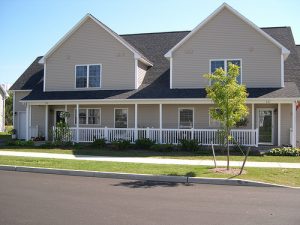During the first few years of the new Millennium, Real Estate Investing was all the rage. People believed that housing prices only went up and never down. Real Estate was seen as the easy road to riches, courses and seminars on real estate investing were everywhere. They taught that the key was to mortgage everything to the hilt and buy more and more houses. But after the housing crash in 2008 attitudes changed and the masses were convinced that real estate will never recover because there are so many foreclosures on the market. The truth lies somewhere in between. ~Tim McMahon, editor
Guide to Real Estate Investing
 Investing in real estate is a great way to build your portfolio but in most cases you have to be patient. If you already own a home, you may be ready for the next step and invest in a second home. Here are some ways to get started in owning investment properties.
Investing in real estate is a great way to build your portfolio but in most cases you have to be patient. If you already own a home, you may be ready for the next step and invest in a second home. Here are some ways to get started in owning investment properties.
The best way to purchase a second home is to put down as much money as you can to keep your monthly mortgage payment to a minimum. If you do this you can have a nice monthly income from your investment property. Keep in mind that the mortgage interest that you will pay on investment property will generally be higher than the interest you pay on a primary home residence.
Positive Cash Flow is Essential
The rent you receive should be more than your mortgage payment (and all other expenses including an allowance for maintenance, repairs, vacancies, insurance, taxes, etc.) Before buying an investment property be sure that it will generate a positive cash flow and thus pay for itself. Even a small negative cash flow can be disastrous over the long term if the market turns down or you have a vacancy or you lose your job.
Methods of Financing Your Real Estate
One way you can purchase a second home is by determining if you have enough equity in your home to use as a down payment to purchase a second home. If that is not an option, perhaps you can qualify for owning both homes but you will have to have enough cash on hand for a down payment for the second home.
Another way you could purchase a second home is with an investment partner. With today’s abysmal investment returns people are looking for places to invest for a better return. By partnering with these people you can increase your real estate holdings. Your down payment should be about 20% of the purchase price.
A third way would be to join a group where many investors pool their funds together and split the equity in the properties. Attend an informational Real Estate investment group meeting and find out what is required to get started.
Property Management
Owning a second home could be very rewarding but does take some work. If you decide you would like to manage the property yourself, make sure you thoroughly screen your tenants, have a rental agreement in place so each party knows their responsibilities, keep good records, and always stay on top of your tenants. Do not let them get in the habit of making late rent payments or destroying your property.
A second way to manage your property is to hire a property manager. They will screen potential tenants, work with tenants on any rental issues that may come up by being the liaison between you and the tenants, and they will collect the rent for you. They usually collect a certain percentage of the monthly rent as their payment which will be deducted from the rent and the remaining sent to you.
There are many benefits of owning a second home. If you have a high income, and are thus in a high tax bracket, the costs of running your investment property will be tax deductible which will lower your overall income for tax purposes and could put you in a lower tax bracket. As your property increases in value (or your mortgage balance decreases), you can use some of the equity in the investment home to purchase other rental properties. Or use the property as a good way to save for your retirement. Owning a second home is a great way to invest in your future, but the key is to only buy properties that generate positive cash flow after all expenses are covered, that way your tenants pay your mortgage and all the expenses. Twenty or thirty years down the road the mortgage will be paid off and your cash flow will drastically increase, thus providing a good retirement income.
See Also:
- What to Look for When You’re Buying Rental Property
- Is Bernanke Stuck in a Housing Time Warp?
- Investing in a Mutual Fund
- Should Your Lease or Buy Your Home?
- Housing Trends- Where are the Home Buyers?
- Pros and Cons of Online Mortgage Calculators
- First Time Home Buyers Need Budgeting Skills
- 3 Tips for Saving Money on Your First Mortgage
- To Rent or Buy: That is the Question
- How Much House Can You Buy?
- Is a House Ever a Good Investment?
This article was written on behalf of LWP Property Group and their top-quality house and land packages in Perth.
Photo Credit: by NNECAPA on Flickr
